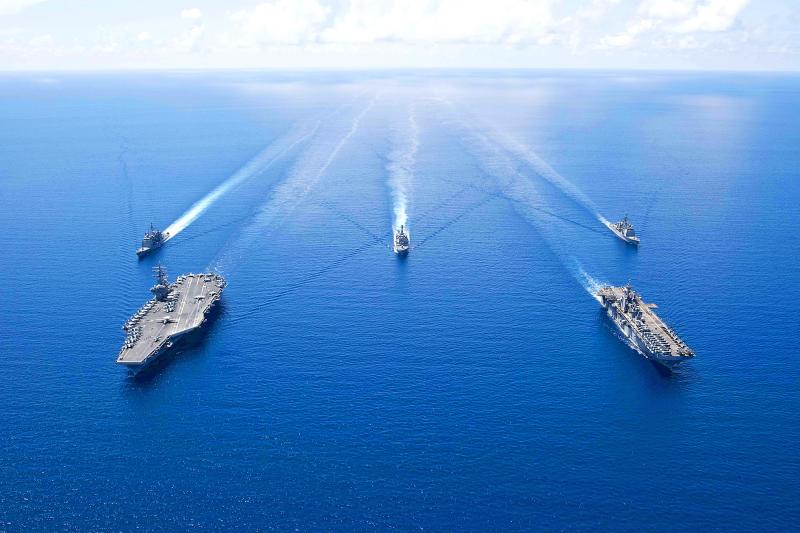Democratic Progressive Party (DPP) legislators yesterday lauded the US’ National Defense Authorization Act for the next fiscal year, which includes an initiative analysts believe would bolster Taiwan’s defenses against China.
The US Senate Committee on Armed Services on June 11 voted 25-2 in favor of approving the act, which would include the Pacific Deterrence Initiative — a US$6.9 billion program that would expand on the US’ 2018 Asia Reassurance Initiative Act and bolster the US’ naval presence in the region.
DPP legislators Wang Ting-yu (王定宇) and Tsai Shih-ying (蔡適應) yesterday welcomed the initiative, saying that it fulfills the US’ promise to defend regional security.

Photo: EPA-EFE
A report published to the Web site of Voice of America on Thursday last week cited analysts who said that the act was likely aimed at countering recent military aggression by China including its sending of a survey ship into Vietnamese waters earlier this year and its trespassing into Taiwan’s air defense zone five times so far this month.
If ratified by US President Donald Trump, the act would see US$1.4 billion budgeted for the initiative next year, and US$5.5 billion spent on it in 2022.
Wang said he believed that the act meant that Taiwan-US military cooperation would increase, and that Taiwan would become more important from a strategic point of view.
Tsai said the US’ increased military investment in the Asia-Pacific meant that it recognized the changing situation in the region, and it believed that maintaining peace and stability in the region was in everyone’s interest.
National Taiwan University associate professor Chen Shih-min (陳世民) said that the upcoming US presidential election is likely playing a part in Washington’s posturing toward China, particularly as the US’ economy has been hit hard by the COVID-19 pandemic.
US senators probably believe they could rally support from smaller Asia-Pacific ally countries that have been threatened by China, but there is no guarantee that Trump would ratify the act, Chen said, adding that it would depend on the state of US-China relations when the act crosses Trump’s desk.
If the act is ratified, it would most certainly result in a backlash from China due to the implications for Taiwan, which China would see as “meddling with its internal affairs,” he said.
“Although Trump likes to play the ‘China card,’ at the end of the day he is a businessman. While he’s seeking re-election he is unlikley to do anything that could impact the US’ agricultural trade with China,” Chen said.

“China is preparing to invade Taiwan,” Deputy Minister of Foreign Affairs Francois Wu (吳志中) said in an exclusive interview with British media channel Sky News for a special report titled, “Is Taiwan ready for a Chinese invasion?” the Ministry of Foreign Affairs said today in a statement. The 25-minute-long special report by Helen Ann-Smith released yesterday saw Sky News travel to Penghu, Taoyuan and Taipei to discuss the possibility of a Chinese invasion and how Taiwan is preparing for an attack. The film observed emergency response drills, interviewed baseball fans at the Taipei Dome on their views of US President

ECONOMIC BENEFITS: The imports from Belize would replace those from Honduras, whose shrimp exports have dropped 67 percent since cutting ties in 2023 Maintaining ties with Taiwan has economic benefits, Ministry of Foreign Affairs officials said yesterday, citing the approval of frozen whiteleg shrimp imports from Belize by the Food and Drug Administration (FDA) as an example. The FDA on Wednesday approved the tariff-free imports from Belize after the whiteleg shrimp passed the Systematic Inspection of Imported Food, which would continue to boost mutual trade, the ministry said. Taiwan’s annual consumption of whiteleg shrimps stands at 30,000 tonnes, far exceeding domestic production, the ministry said. Taiwan used to fill the gap by importing shrimps from Honduras, but purchases slumped after Tegucigalpa severed diplomatic ties with Taiwan

The Executive Yuan yesterday approved a southwestern extension of the Sanying MRT Line from New Taipei to Bade District (八德) in Taoyuan, with a goal of starting construction by late 2026. The 4.03-kilometer extension, featuring three new stations, will run from the current terminus at Yingtao Fude Station (LB12) in New Taipei City to Dannan Station (LB14), where it will connect with Taoyuan’s Green Line, New Taipei City Metro Corp said in a statement. This extension will follow the completion of core Sanying Line, a 14.29-kilometer medium-capacity system linking Tucheng (土城), Sansia (三峽)

CARGO LOSS: About 50 containers at the stern of the ‘Ever Lunar’ cargo ship went overboard, prompting the temporary closure of the port and disrupting operations Evergreen Marine Corp, Taiwan’s largest container shipper, yesterday said that all crew members aboard the Ever Lunar (長月) were safe after dozens of containers fell overboard off the coast of Peru the previous day. The incident occurred at 9:40am on Friday as the Ever Lunar was anchored and waiting to enter the Port of Callao when it suddenly experienced severe rolling, Evergreen said in a statement. The rolling, which caused the containers to fall, might have been caused by factors including a tsunami triggered by an earthquake in Russia, poor winter sea conditions in South America or a sudden influx of waves,